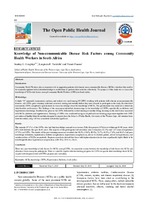Knowledge of non-communicable disease risk factors among community health workers in South Africa

View/
Date
2020Author
Onagbiye, Sunday O
Tsolekile, Lungiswa P
Puoane, Thandi
Metadata
Show full item recordAbstract
Introduction:
Community Health Workers play an important role in supporting patients with chronic non-communicable diseases (NCDs), therefore they need to
be constantly updated with current knowledge to enable them to perform their activities effectively. The purpose of this study was to assess the
knowledge of NCDs risk factors among Community Health Workers (CHWs) in South Africa.
Methodology:
A triple “A” approach (assessment, analysis, and action) was used among 40 CHWs working with patients with chronic non-communicable
diseases. All CHWs gave voluntary, informed consent in writing and verbally before they were allowed to participate in the study. For the initial
assessment, CHWs completed a questionnaire to assess knowledge about the knowledge of NCDs. The questionnaire was analysed to determine
their baseline performance. The findings of the assessment identified shortcomings in the knowledge of CHWs, specifically on diabetes and
hypertension knowledge. Feedback was given to the CHWs followed by a short training on healthy living, focusing on the risk factors associated
with NCDs (diabetes and hypertension). Training of CHWs was conducted using an adapted national training programme together with CHW
prevention of healthy lifestyle modules designed by experts from the School of Public Health, University of the Western Cape. All statistical tests
were two-tailed, and p<.05 was considered statistically significant.
Results:
The majority (97.5%) of the CHWs who had their knowledge assessed were women. Fifty-five percent (55%) were within age 30-45 years, while
45% were between the ages 46-60 years. The majority of the participants had secondary school education (92.5%) and 1-15 years of experience
(97.5%) as CHWs. The results of the post-training assessment revealed that 48.5%, 63.6%, 42.4%, 72.7%, 42.5%, 57.6%, and 18.2% had poor
knowledge of diabetes, hypertension, diabetes complications, hypertension complications, advice for diabetic patient, advice for hypertension, and
nutrition advice of NCDs, respectively. Regression analysis showed that those with higher education levels were significantly highly likely to be
knowledgeable about hypertension complications (OR=19.6, CI=1.14, 336.0).
